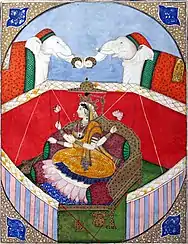Lakshmi
Parvati
Saraswati
| Part of a series on |
| Hinduism |
|---|
 |
Ishvari (Sanskrit: ईश्वरी, IAST: Īśvarī) is a Hindu epithet of Sanskrit origin, referring to the Goddess, the divine female counterpart of Ishvara. It is also a term that refers to the shakti, or the feminine energy of the Trimurti, which refer to Saraswati, Lakshmi, and Parvati.[1]
Etymology
The root of the word is the Sanskrit syllable īś, "to be valid or powerful ; to be master of", joined with vara, "select, choicest, valuable, precious, best, most excellent or eminent among" [2] When referring to divine as female, particularly in Shaktism, the feminine Īśvarī is sometimes used.[3]
References
- ↑ www.wisdomlib.org (29 August 2015). "Ishvari, Īśvarī: 14 definitions". www.wisdomlib.org. Retrieved 7 September 2022.
- ↑ "Sanskrit and Tamil Dictionaries".
- ↑ Roshen Dalal (2010). Hinduism: An Alphabetical Guide. Penguin Books. p. 376. ISBN 978-0-14-341421-6.
This article is issued from Wikipedia. The text is licensed under Creative Commons - Attribution - Sharealike. Additional terms may apply for the media files.


